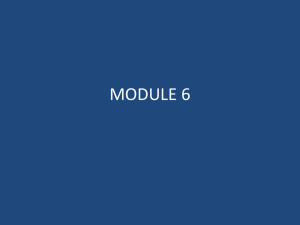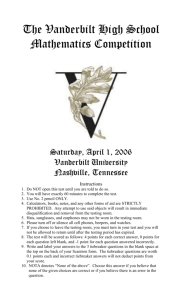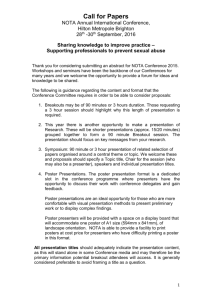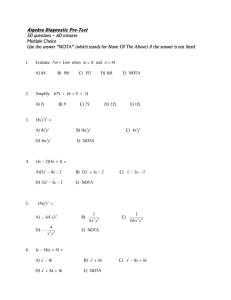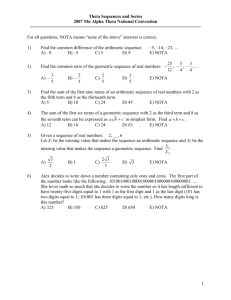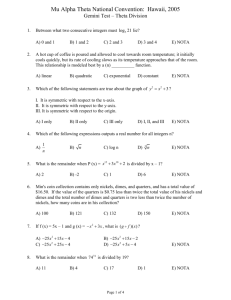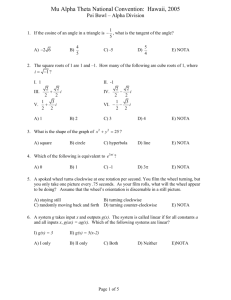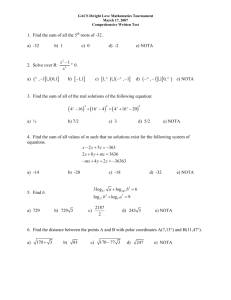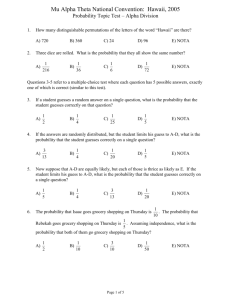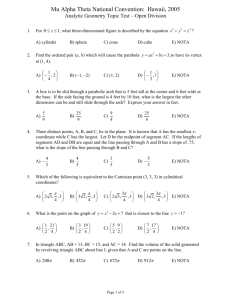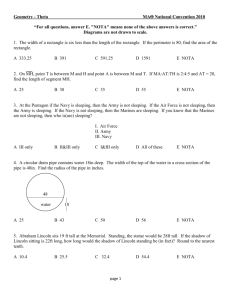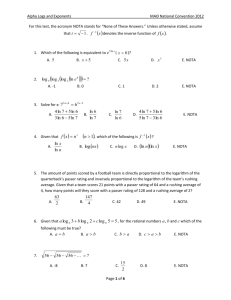1. Test question here
advertisement
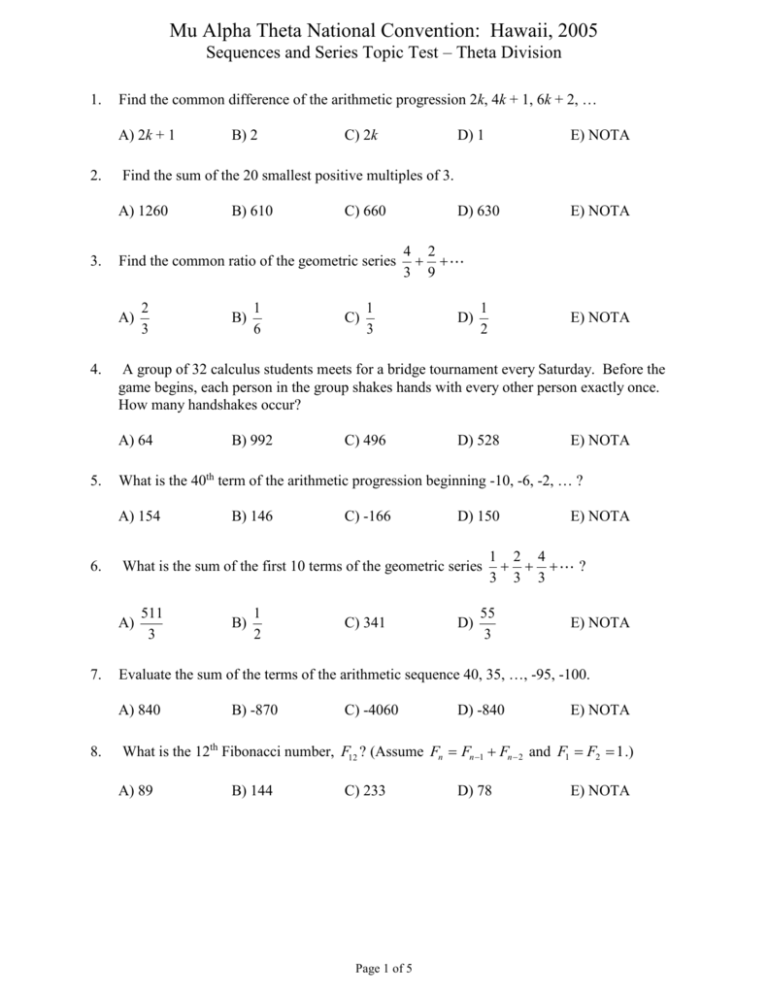
Mu Alpha Theta National Convention: Hawaii, 2005 Sequences and Series Topic Test – Theta Division 1. Find the common difference of the arithmetic progression 2k, 4k + 1, 6k + 2, … A) 2k + 1 2. 2 3 511 3 D) 630 E) NOTA B) 1 6 C) 4 2 3 9 1 3 D) 1 2 E) NOTA B) 992 C) 496 D) 528 E) NOTA B) 146 C) -166 D) 150 B) 1 2 C) 341 D) 1 2 4 3 3 3 55 3 E) NOTA ? E) NOTA Evaluate the sum of the terms of the arithmetic sequence 40, 35, …, -95, -100. A) 840 8. C) 660 What is the sum of the first 10 terms of the geometric series A) 7. E) NOTA What is the 40th term of the arithmetic progression beginning -10, -6, -2, … ? A) 154 6. D) 1 A group of 32 calculus students meets for a bridge tournament every Saturday. Before the game begins, each person in the group shakes hands with every other person exactly once. How many handshakes occur? A) 64 5. B) 610 Find the common ratio of the geometric series A) 4. C) 2k Find the sum of the 20 smallest positive multiples of 3. A) 1260 3. B) 2 B) -870 C) -4060 D) -840 E) NOTA What is the 12th Fibonacci number, F12 ? (Assume Fn Fn 1 Fn 2 and F1 F2 1 .) A) 89 B) 144 C) 233 Page 1 of 5 D) 78 E) NOTA Mu Alpha Theta National Convention: Hawaii, 2005 Sequences and Series Topic Test – Theta Division 9. James, an eccentric millionaire, has bought a unique 24-story mansion in which every floor has 5 more rooms than the floor below it. There are 3 rooms on the bottom floor. What is the total number of rooms in the mansion? A) 1416 B) 1452 C) 2400 D) 1412 E) NOTA 10. What is the 40th triangular number, T40 ? (Assume T1 1 and Tn n Tn 1 .) A) 1640 B) 780 C) 1600 D) 820 E) NOTA C) 55 D) -5 E) NOTA D) 5625 E) NOTA 11. If a n n 2 2n 7 , what is a 6 ? A) 31 B) 17 12. Find the sum of the 150 smallest odd positive integers. A) 22650 B) 22500 C) 11325 13. Find the sum of the terms of the geometric sequence 27, 9, 3, … A) 40.5 B) 54 C) 40 D) 81 E) NOTA 14. As part of a science experiment, Richard drops a ping-pong ball out of his 3rd story window (25 m above the ground). From the data, he has determined that the ping-pong ball rebounds 40% of the height from which it falls. How high will it rise on its 6th bounce? A) 25.6 cm B) 10.24 cm C) 64 cm D) 4.096 cm E) NOTA 15. What is the 32nd perfect cube? (Assume that 1 is the 1st). A) 1024 B) 32768 C) 96 Page 2 of 5 D) 256 E) NOTA Mu Alpha Theta National Convention: Hawaii, 2005 Sequences and Series Topic Test – Theta Division 16. A diagonal is drawn through a square with side length 2 cm. A smaller square is constructed, one vertex coinciding with the large square and another coinciding with the midpoint of one side of the large square. The diagonal of the smaller square is drawn, starting from the coincident vertex of the two squares, where the first diagonal terminated. (See figure.) If this pattern continues infinitely, what is the length (in cm) of all diagonals drawn? B) 4 2 4 A) 4 C) 4 2 D) 4 2 2 E) NOTA 17. Thom and Tom, both avid gamblers, decide to play a game of chance. They take turns rolling three fair 6-sided dice, continuing forever until one person rolls triples (all three dice showing the same number). The person who rolls triples is declared the loser. To make things interesting, Tom agrees to bet $10 that he will win, provided that Thom allows Tom to roll first. What is the probability that Thom will win the bet? A) 35 71 B) 18. Evaluate 1 (2 3i) n 0 A) 3i 1 10 n B) 36 71 C) 216 531 D) 215 531 E) NOTA 11 3i 10 D) diverges E) NOTA , where i 1 . 1 3i 10 C) 19. Find the product of the twenty smallest positive even numbers. A) 220 20! B) 2 20 C) 20! D) 210 10! E) NOTA 20. The Fibonacci sequence can be extrapolated before the positive integers such that the 0th term is 0, the -1st term is 1, and so on. In this extrapolated Fibonacci sequence, what is the 15 th term? A) 15 B) -15 C) 610 D) -610 E) NOTA B) 396900 C) 14910 D) 7770 E) NOTA 35 21. Evaluate: n 2 n 1 A) 630 Page 3 of 5 Mu Alpha Theta National Convention: Hawaii, 2005 Sequences and Series Topic Test – Theta Division 22. The formula 2n 1 n 2 n 1 generates the nth centered cube number. What is the sum of the first 3 centered cube numbers? A) 35 B) 45 C) 36 D) 87 E) NOTA 23. On Monday, June 6, 2005, Keith paid $10 for lunch. The next day, he bought a bigger lunch and paid 10% more than before. On each following day, he spent 10% more than the previous day, until the 10th day, when his lunch cost $10 again. Assuming this pattern continues indefinitely, how much did he pay for lunch on Monday, June 27, 2005? A) $13.31 B) $12.10 C) $11 D) $10 E) NOTA 2 24. Find the value(s) of the following continued fraction: 3 3 2 3 3 A) 3 17 2 B) 13 97 6 C) 3 17 2 D) . 2 2 3 13 97 6 E) NOTA 25. Each of the five Read sisters picks a real number at random. Amazingly, the numbers they choose, when ordered from least to greatest, form a geometric progression. The youngest sister, Brenda, chose the smallest number, 16. The oldest sister, Bryana, chose the largest number, 36. What is the sum of all five sisters’ chosen numbers? A) 76 B) 76 20 6 C) 44 40 3 D) 107 71 6 2 E) NOTA 26. For a given quadratic sequence Q, Q1 10 , Q3 18 , and Q5 27 . What is Q6 ? A) 37 B) 36 C) 162 5 D) 73 2 E) NOTA 27. Find the value(s) of the common ratio of the geometric sequence a, b, 6, … given that a b 1. A) 3 15 B) 3 15 C) 3 15 Page 4 of 5 D) 4 15 E) NOTA Mu Alpha Theta National Convention: Hawaii, 2005 Sequences and Series Topic Test – Theta Division 28. If f ( x) f ( x 1) 2 and f (1) 5 , find f (5) . A) 5 B) –4 C) –3 D) –1 E) NOTA 21 16 E) NOTA 1 n . n n 0 5 29. Evaluate the sum: A) 5 16 B) 5 4 C) 25 16 D) 30. The nth Cullen number is Cn n 2n 1 . Find the number of digits in the base 10 representation of the sum of the first 2005 Cullen numbers (starting with C1 3 ). A) 607 B) 608 C) 2017 Page 5 of 5 D) 2018 E) NOTA
